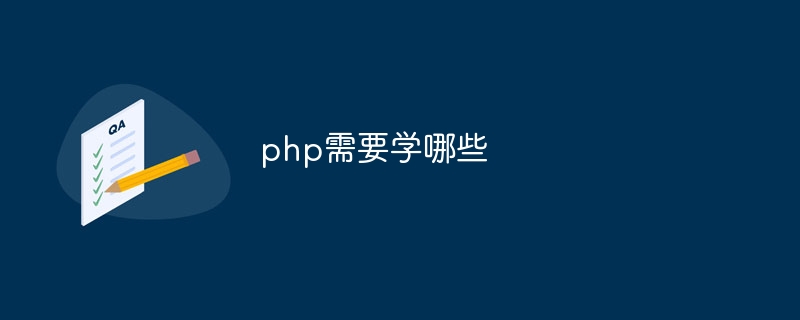Home >Backend Development >PHP Problem >What do you need to learn about PHP?
What do you need to learn about PHP?
- 小老鼠Original
- 2023-07-13 16:43:361978browse
php needs to learn: 1. Grammar basics, understand the basic grammar and language features of PHP; 2. Database operations, master how to connect to the database, and perform data addition, deletion, modification and query operations; 3. File operations, learn how to Manipulating files and directories is the basis for file management and processing; 4. Form processing, learn PHP form processing; 5. Functions and classes, understand how to define and use functions, and learn the concept and use of classes; 6. Security considerations, master Security knowledge; 7. Frameworks and libraries. Learning to use PHP frameworks and libraries can greatly improve development efficiency.

The operating environment of this tutorial: Windows 10 system, PHP8.1.3 version, Dell G3 computer.
PHP is a server-side scripting language widely used in web development, and it has become one of the most popular languages in the field of modern web development. Many large websites and applications are built using PHP, so learning PHP has become the first choice for many developers.
Before learning PHP, you first need to master front-end basic knowledge such as HTML, CSS and JavaScript. Because PHP is mainly used for server-side processing of interaction with users, cooperation with the front-end is essential.
Next, let’s take a look at the specific content of PHP learning.
1. Grammar basics: Understanding the basic syntax and language features of PHP is the first step in learning PHP. This includes variables, data types, operators, control structures, loop structures, etc. Only by mastering these basic knowledge can you write simple PHP programs.
2. Database operation: PHP can interact with a variety of databases, such as MySQL, PostgreSQL, Oracle, etc. An important step in learning PHP is to master how to connect to the database and perform data addition, deletion, modification and query operations. It is also necessary to understand the SQL language and basic database design principles.
3. File operation: PHP can operate the file system, including reading and writing files, processing directories, uploading and downloading files, etc. Learning how to manipulate files and directories is the basis for file management and processing.
4. Form processing: In web development, users often need to fill in forms and submit data. PHP provides powerful functions for processing forms, including data validation, data filtering, security verification, etc. Learning PHP form processing can help us build user-friendly web pages.
5. Functions and classes: Functions are a set of encapsulated blocks of code that can be called multiple times. Understanding how to define and use functions is an important step in improving your PHP programming efficiency. In addition, PHP is also an object-oriented language, and learning the concepts and uses of classes can make the code more modular and reusable.
6. Security considerations: In web development, security is very important. Learning how to prevent security vulnerabilities such as SQL injection, cross-site scripting (XSS), and cross-site request forgery (CSRF) is necessary. Mastering security knowledge can help us build safe and reliable applications.
7. Frameworks and libraries: PHP has numerous frameworks and libraries, such as Laravel, CodeIgniter, Symfony, etc. Learning to use these frameworks and libraries can greatly improve development efficiency and follow best programming practices.
To sum up, the knowledge you need to master to learn PHP includes syntax basics, database operations, file operations, form processing, functions and classes, security considerations, frameworks and libraries, etc. Through continuous practice and accumulation of experience, we can gradually become skilled PHP developers and be able to build high-quality web applications.
The above is the detailed content of What do you need to learn about PHP?. For more information, please follow other related articles on the PHP Chinese website!

